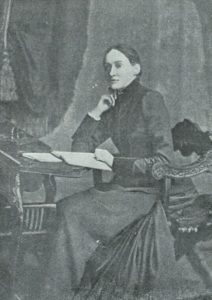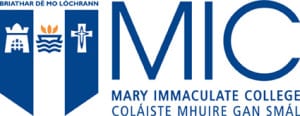Research Pioneers 5: Lucy Collins
Lucy Collins’ Poetry by Women in Ireland: A Critical Anthology 1870-1970, published by Liverpool University Press in 2012, has made a crucial intervention in the field of Irish women’s literary history. As one reviewer described it, it reveals ‘a hitherto hidden history of poetry’ and ‘contradict[s] the received narrative of Irish poetry’. Anthologies form a vital part of recovery work that opens up new avenues for research and reinvigorates teaching practice. We’ve taken the opportunity to ask Collins to reflect on the opportunities and challenges of such critical editing.
This is the fifth interview in the Research Pioneers Series. Our first interview with John Wilson Foster is available here, Heather Ingman and Clíona Ó Gallchoir is here, James H Murphy is here and Heidi Hansson is here.
Q: What initially drew you to the study of Irish women’s writing?

LC: When I was an undergraduate at Trinity College Dublin, I had the opportunity to take a writing workshop with Eavan Boland. In these sessions discussion ranged widely, and I was introduced to poets from all over the world – texts in English and in translation from writers I had never heard of before. Boland’s political interests made me newly aware of the challenges that women writers faced in having their work published and read, and I was curious to find out more about Irish women poets in this context, since none of them featured on the university curriculum. So I bought the anthology Pillars of the House, edited by A. A. Kelly (Wolfhound Press, 1987) and was fascinated by the range of voices I found there. At that point I intended to write my doctoral thesis on Irish women poets but was deflected from the subject. I was never quite able to put aside that interest though…
Q: In your comprehensive ‘Introduction’ to this anthology, you outline your aim ‘to make available the work of writers who are either forgotten or, if remembered, are framed within a limited critical discourse’. Can you tell us what prompted the idea for the anthology and how the project developed?
LC: The main impetus behind the anthology was the experience of teaching modern Irish poetry in universities, first in the UK and then in Ireland, and finding so few women writing before the 1970s whose work was still in print. Since there was no anthology of poetry by Irish women available either, I found myself photocopying poems from library books to distribute to the class. It was such a frustrating process, and I felt that it sent the wrong message to students – it suggested that the poems by men in the course anthology were at the core of the module, and those by women were some kind of optional extra. It seemed that the only solution was to put together an anthology myself, so I sent a proposal to Anthony Cond at Liverpool University Press, who was very receptive to the idea, and extremely supportive in bringing the project to fruition.
Q: The anthology includes works by 15 women poets over a period of one hundred years. Some of the names such as Katharine Tynan, Dora Sigerson Shorter and Emily Lawless are more familiar while others including Winifred M. Letts and Emily Hickey are not. How and where did you encounter the lesser known women poets and what were the challenges in accessing their work?
LC: I felt from the beginning that the anthology had two purposes. The first was to make a representative group of texts from a range of Irish women poets available for those who wanted to read and teach them. The second aim was to bring poets with whom few people would be familiar to broader attention. I explored a large number of poetry anthologies published between the late nineteenth century and the present, to track exactly how many women were included, and which names appeared in multiple volumes. I also trawled through newspapers and literary journals looking for printed poems, and checking book reviews and literary articles. I spent quite a while – probably too long – at this stage of the process, but it confirmed some interesting hunches. One thing I observed was that women often appeared in anthologies when they were actively participating in literary circles but disappeared from sight very quickly once they had stopped writing. Another point was that these women tended to be represented by a very small gathering of work, and often the same poems from one anthology to the next. As a result of these discoveries, I decided to include fewer poets in my book than I had first envisaged, but to choose at least a dozen poems by each woman. This meant that, even in the case of the better-known figures, I hoped to introduce unfamiliar poems to readers. I felt that this would allow new dimensions of each writer’s work to become visible. When we have access to just a few texts it is impossible to understand a poet’s enduring concerns, or to trace her creative development. These are essential processes if the achievement of women is to be taken seriously.
Q: How did you go about selecting the poems?
LC: Having decided to focus on a smaller number of poets, I then had to fix the date range of the book. I found this hard to resolve, since there was such an interesting range of texts, and so many poets whose work would benefit from exposure. I knew from examining earlier anthologies that the generation of women who began publishing in the late 1960s did not really need further representation – the poetry of Eavan Boland, Eiléan Ní Chuilleanáin and younger figures was readily available to readers. At first I considered beginning the anthology immediately after the Great Famine, but I realised that a later date of 1870 wouldn’t radically alter my choice of nineteenth-century poets, so I settled the date range 1870-1970, a neat one hundred year span. I began reading work by women who had published at least one book of poems during these years, as this meant that they had a readership in their own lifetime, and an active creative process over a period. So, I parked myself in the National Library of Ireland and read every book of poems by a woman from this period in their catalogue. I also made good use of UCD Library and Special Collections which have excellent modern Irish poetry holdings, and a strong track-record of acquiring work by women.
Q: In retrospect, what was the most challenging aspect of the project and what, if anything, would you do differently if you could start all over?
LC: I think the most demanding aspect of the project was its boundless nature. It seemed as though it could go on indefinitely, such was the range and interest of the poems I found. The anthology also required a challenging combination of textual, bibliographical and biographical skills, and I thought it was important to find the right balance among these different elements, even though this meant curtailing work in particular areas. I think if I were to begin again, I would devote more space to evaluating each poet’s creative life and achievement, and I would explore early on the possibility of creating a parallel online anthology with more expansive poetry selections.
Q: Can you recall a particular ‘Eureka moment’ from the archives?

LC: There was no single ‘Eureka moment’ as such, because what was most striking – and most moving – about this project was the cumulative nature of the discovery. Out of the countless poems, reviews, letters and memoirs came a growing awareness of the energy and commitment of generations of women poets, so many of them now forgotten. And that journey continues: last year I was excited to find letters from Blanaid Salkeld among the Leslie Daiken papers at the Harry Ransom Center, at the University of Texas at Austin – they were so vivid and immediate. Spending time with the Lola Ridge papers at Smith College was also a privilege and prompted me to think more about transnational identities and their impact on the visibility of women writers.
Q: What book, play or poem/poetry collection written by an Irish woman between 1880 and 1920 do you feel deserves more attention and respect, and why?

LC: I would love to see Hallow-e’en and Poems of the War (1916) by Winifred Letts back in print. While Letts had a long writing career, publishing fiction and work for children, as well as a memoir, this book is an extraordinary one. It includes a suite of poems that draw on Letts’ experience as a nurse during the First World War, when she was stationed at a Manchester hospital. Before other writers had come to recognise the barbarity of the conflict, and the disproportionate suffering of the ordinary soldiers, Letts was alert to the prejudice and injustice inherent in militarism and wrote movingly – and often bitterly – about the fate of these men. As an Irish woman, and a poet of the First World War, Letts has faced a double exclusion from our national tradition and these poems in particular deserve greater critical attention.
Q: What, in your view, are the most important issues and most promising avenues for future research in Irish women’s writing?
LC: The time has come for some comprehensive scholarly editions of a number of these women poets. It’s exciting to see that women’s writing is gaining more attention through the Fired! movement and the Irish Women Writers Network, as well as in new scholarship from early career researchers, so it is important that women poets whose achievements are especially significant now attract more sustained critical scrutiny both in Ireland and further afield. Without this deepening of engagement with the work of key women poets, we will never move beyond the discovery phase and be condemned to repeat the patterns of loss and retrieval again and again in the future.
To reference this blog:
Harvard style:
Collins, Lucy (2020), ‘Research Pioneers’, Interviewed by Anna Pilz and Whitney Standlee for Irish Women’s Writing (1880-1920) Network, (February, 2020). Available at:
To reference this blog:
Harvard style:
Collins, Lucy (2020), ‘Research Pioneers’, Interviewed by Anna Pilz and Whitney Standlee for Irish Women’s Writing (1880-1920) Network, (February, 2020). Available at:
To reference this blog:
Harvard style:
Collins, Lucy (2020), ‘Research Pioneers’, Interviewed by Anna Pilz and Whitney Standlee for Irish Women’s Writing (1880-1920) Network, (February, 2020). Available at: https://irishwomenswritingnetwork.com/2020/02/17/research-pioneers-5-lucy-collins/(Accessed: Date)



